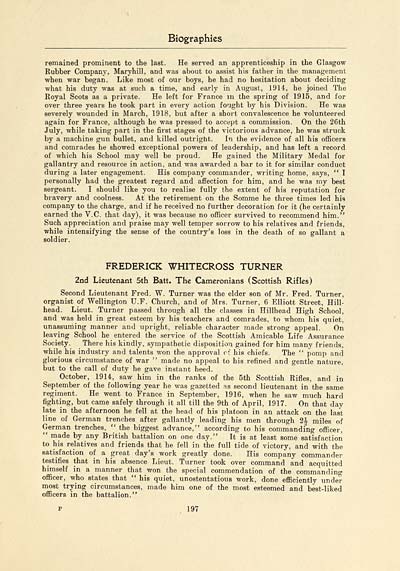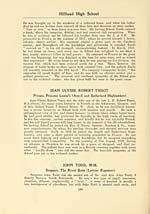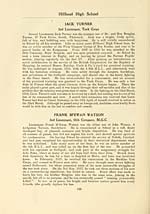Organisations > Hillhead High School war memorial volume
(201) Page 197
Download files
Complete book:
Individual page:
Thumbnail gallery: Grid view | List view

Biographies
remained prominent to the last. He served an apprenticeship in the Glasgow
Rubber Company, Maryhill, and was about to assist his father in the management
when war began. Like most of our boys, he had no hesitation about deciding
what his duty was at such a time, and early in August, 1914, he joined The
Royal Scots as a private. He left for France in the spring of 1915, and for
over three years he took part in every action fought by his Division. He was
severely wounded in March, 1918, but after a short convalescence he volunteered
again for France, although he was pressed to accept a commission. On the 26th
July, while taking part in the first stages of the victorious advance, he was struck
by a machine gun bullet, and killed outrignt. In the evidence of all his officers
and comrades he showed exceptional powers of leadership, and has left a record
of which his School may well be proud. He gained the Military Medal for
gallantry and resource in action, and was awarded a bar to it for similar conduct
during a later engagement. His company commander, writing home, says, " I
personally had the greatest regard and affection for him, and he was my best
sergeant. I should like you to realise fully the extent of his reputation for
bravery and coolness. At the retirement on the Somme he three times led his
company to the charge, and if he received no further decoration for it (he certainly
earned the V.C. that day), it was because no officer survived to recommend him."
Such appreciation and praise may well temper sorrow to his relatives and friends,
while intensifying the sense of the country's loss in the death of so gallant a
soldier.
FREDERICK WHITECROSS TURNER
2nd Lieutenant 5th Batt. The Cameronians (Scottish Rifles)
Second Lieutenant Fred. W. Turner was the elder son of Mr. Fred. Turner,
organist of Wellington U.F. Church, and of Mrs. Turner, 6 Elliott Street, Hill-
head. Lieut. Turner passed through all the classes in Hillhead High School,
and was held in great esteem by his teachers and comrades, to whom his quiet,
unassuming manner and upright, reliable character made strong appeal. On
leaving School he entered the service of the Scottish Amicable Life Assurance
Society. _ There his kindly, sympathetic disposition gained for him many friends,
while his industry and talents won the approval rf his chiefs. The " pomp and
glorious circumstance of war " made no appeal to his refined and gentle nature,
but to the call of duty he gave instant heed.
October, 1914, saw him in the ranks of the 5th Scottish Rifles, and in
September of the following year he was gazetted as second lieutenant in the same
regiment. He went to France in September, 1916, when he saw much hard
fighting, but came safely through it all till the 9th of April, 1917. On that day
late in the afternoon he fell at the head of his platoon in an attack on the last
line of German trenches after gallantly leading his men through 2J miles of
German trenches, " the biggest advance," according to his commanding officer,
" made by any British battalion on one day." It is at least some satisfaction
to his relatives and friends that he fell in the full tide of victory, and with the
satisfaction of a great day's work greatly done. His company commander
testifies that in his absence Lieut. Turner took over command and acquitted
himself in a manner that won the special commendation of the commanding
officer, who states that " his quiet, unostentatious work, done efficiently under
most trying circumstances, made him one of the most esteemed and best-liked
officers in the battalion."
P 197
remained prominent to the last. He served an apprenticeship in the Glasgow
Rubber Company, Maryhill, and was about to assist his father in the management
when war began. Like most of our boys, he had no hesitation about deciding
what his duty was at such a time, and early in August, 1914, he joined The
Royal Scots as a private. He left for France in the spring of 1915, and for
over three years he took part in every action fought by his Division. He was
severely wounded in March, 1918, but after a short convalescence he volunteered
again for France, although he was pressed to accept a commission. On the 26th
July, while taking part in the first stages of the victorious advance, he was struck
by a machine gun bullet, and killed outrignt. In the evidence of all his officers
and comrades he showed exceptional powers of leadership, and has left a record
of which his School may well be proud. He gained the Military Medal for
gallantry and resource in action, and was awarded a bar to it for similar conduct
during a later engagement. His company commander, writing home, says, " I
personally had the greatest regard and affection for him, and he was my best
sergeant. I should like you to realise fully the extent of his reputation for
bravery and coolness. At the retirement on the Somme he three times led his
company to the charge, and if he received no further decoration for it (he certainly
earned the V.C. that day), it was because no officer survived to recommend him."
Such appreciation and praise may well temper sorrow to his relatives and friends,
while intensifying the sense of the country's loss in the death of so gallant a
soldier.
FREDERICK WHITECROSS TURNER
2nd Lieutenant 5th Batt. The Cameronians (Scottish Rifles)
Second Lieutenant Fred. W. Turner was the elder son of Mr. Fred. Turner,
organist of Wellington U.F. Church, and of Mrs. Turner, 6 Elliott Street, Hill-
head. Lieut. Turner passed through all the classes in Hillhead High School,
and was held in great esteem by his teachers and comrades, to whom his quiet,
unassuming manner and upright, reliable character made strong appeal. On
leaving School he entered the service of the Scottish Amicable Life Assurance
Society. _ There his kindly, sympathetic disposition gained for him many friends,
while his industry and talents won the approval rf his chiefs. The " pomp and
glorious circumstance of war " made no appeal to his refined and gentle nature,
but to the call of duty he gave instant heed.
October, 1914, saw him in the ranks of the 5th Scottish Rifles, and in
September of the following year he was gazetted as second lieutenant in the same
regiment. He went to France in September, 1916, when he saw much hard
fighting, but came safely through it all till the 9th of April, 1917. On that day
late in the afternoon he fell at the head of his platoon in an attack on the last
line of German trenches after gallantly leading his men through 2J miles of
German trenches, " the biggest advance," according to his commanding officer,
" made by any British battalion on one day." It is at least some satisfaction
to his relatives and friends that he fell in the full tide of victory, and with the
satisfaction of a great day's work greatly done. His company commander
testifies that in his absence Lieut. Turner took over command and acquitted
himself in a manner that won the special commendation of the commanding
officer, who states that " his quiet, unostentatious work, done efficiently under
most trying circumstances, made him one of the most esteemed and best-liked
officers in the battalion."
P 197
Set display mode to: Large image | Transcription
Images and transcriptions on this page, including medium image downloads, may be used under the Creative Commons Attribution 4.0 International Licence unless otherwise stated. ![]()
| Rolls of honour > Organisations > Hillhead High School war memorial volume > (201) Page 197 |
|---|
| Permanent URL | https://digital.nls.uk/100542295 |
|---|---|
| Description | Listed alphabetically. |
|---|

